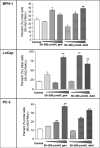Differential effects of whole soy extract and soy isoflavones on apoptosis in prostate cancer cells
- PMID: 20404023
- PMCID: PMC4125131
- DOI: 10.1258/ebm.2009.009128
Differential effects of whole soy extract and soy isoflavones on apoptosis in prostate cancer cells
Abstract
Previous studies have suggested that soy isoflavones exert anticarcinogenic effects against prostate cancer. We propose that soy extracts, containing a mixture of soy isoflavones and other bioactive components, would be a more potent chemo-preventive agent than individual soy isoflavones. We compared the apoptotic effects of whole soy extracts and individual soy isoflavones, genistein and daidzein, on prostate cancer cells. The soy extract contained 50% w/w of total isoflavones with approximately 1:5.5:3.5 ratios of genistin, daidzin and glycitin, respectively. Benign prostate hyperplasia (BPH-1), LnCap and PC3 cells were treated with varying concentrations of soy extract, genistein or daidzein and analyzed for cell cycle alterations and induction of apoptosis. At equal concentrations (25 micromol/L), soy extract induced a significantly higher percentage of cells undergoing apoptosis than genistein or daidzein (P < 0.001). No significant changes in cell cycle arrest or apoptosis were observed in non-cancerous BPH-1 cells treated with soy extract, suggesting that the effects of soy extract may be tumor cell specific. On the contrary, both genistein and daidzein induced apoptosis in BPH-1 cells, suggesting that individual isoflavones may have cytotoxicity in non-cancerous cells. Soy extracts also increased Bax expression in PC3 cells, but no significant changes in nuclear factor kappaB (NF kappaB) activation were detected, suggesting that the induction of apoptosis was independent of the NF kappaB pathway. Food products that bear a combination of active compounds may be more efficacious and safer as chemo-preventive agents than individual compounds. This 'whole-food'-based approach is significant for the development of public health recommendations for prostate cancer prevention.
Figures




Similar articles
-
Combination of low dose of genistein and daidzein has synergistic preventive effects on isogenic human prostate cancer cells when compared with individual soy isoflavone.Food Chem. 2013 Dec 1;141(3):1923-33. doi: 10.1016/j.foodchem.2013.04.109. Epub 2013 May 9. Food Chem. 2013. PMID: 23870911
-
Apoptotic effects of cooked and in vitro digested soy on human prostate cancer cells.Food Chem. 2012 Dec 1;135(3):1643-52. doi: 10.1016/j.foodchem.2012.06.023. Epub 2012 Jun 26. Food Chem. 2012. PMID: 22953905
-
Daidzein effect on hormone refractory prostate cancer in vitro and in vivo compared to genistein and soy extract: potentiation of radiotherapy.Pharm Res. 2010 Jun;27(6):1115-27. doi: 10.1007/s11095-010-0107-9. Epub 2010 Mar 23. Pharm Res. 2010. PMID: 20309614
-
Genistein and daidzein: different molecular effects on prostate cancer.Anticancer Res. 2013 Jan;33(1):39-44. Anticancer Res. 2013. PMID: 23267126 Review.
-
The role of soy phytoestrogens in prostate cancer.Curr Opin Urol. 2005 Jan;15(1):17-22. doi: 10.1097/00042307-200501000-00005. Curr Opin Urol. 2005. PMID: 15586024 Review.
Cited by
-
ViscumTT induces apoptosis and alters IAP expression in osteosarcoma in vitro and has synergistic action when combined with different chemotherapeutic drugs.BMC Complement Altern Med. 2017 Jan 7;17(1):26. doi: 10.1186/s12906-016-1545-7. BMC Complement Altern Med. 2017. PMID: 28061770 Free PMC article.
-
Phytoestrogens and risk of prostate cancer: a meta-analysis of observational studies.World J Surg Oncol. 2015 Jul 31;13:231. doi: 10.1186/s12957-015-0648-9. World J Surg Oncol. 2015. PMID: 26228387 Free PMC article.
-
The flavonoid beverage Haelan 951 induces growth arrest and apoptosis in pancreatic carcinoma cell lines in vitro.BMC Complement Altern Med. 2015 Jul 3;15:212. doi: 10.1186/s12906-015-0734-0. BMC Complement Altern Med. 2015. PMID: 26138287 Free PMC article.
-
Molecular Basis of Prostate Cancer and Natural Products as Potential Chemotherapeutic and Chemopreventive Agents.Front Pharmacol. 2021 Sep 23;12:738235. doi: 10.3389/fphar.2021.738235. eCollection 2021. Front Pharmacol. 2021. PMID: 34630112 Free PMC article. Review.
-
Chickpea Sprouts as a Potential Dietary Support in Different Prostate Disorders-A Preliminary In Vitro Study.Molecules. 2024 Feb 28;29(5):1044. doi: 10.3390/molecules29051044. Molecules. 2024. PMID: 38474555 Free PMC article.
References
-
- Jemal A, Siegel R, Ward E, Hao Y, Xu J, Murray T, Thun MJ. Cancer statistics, 2008. CA Cancer J Clin. 2008;58:71–96. - PubMed
-
- Dixon RA. Phytoestrogens. Annu Rev Plant Biol. 2004;55:225–61. - PubMed
-
- Cook LS, Goldoft M, Schwartz SM, Weiss NS. Incidence of adenocarcinoma of the prostate in Asian immigrants to the United States and their descendants. J Urol. 1999;161:152–5. - PubMed
-
- Gugger ET. Industrial processing and preparation of isoflavones. In: Gilani GS, Anderson JB, editors. Phytoestrogens and Health. AOCS Press; Champaign, IL: 2002. pp. 83–94.
-
- Lamartiniere CA. Protection against breast cancer with genistein: a component of soy. Am J Clin Nutr. 2000;71(6 Suppl):1705S–7S. discussion 1708S-9S. - PubMed
Publication types
MeSH terms
Substances
Grants and funding
LinkOut - more resources
Full Text Sources
Medical
Research Materials

